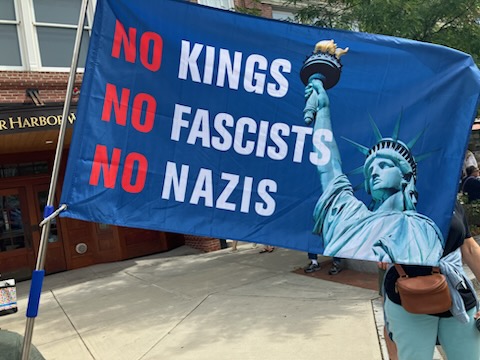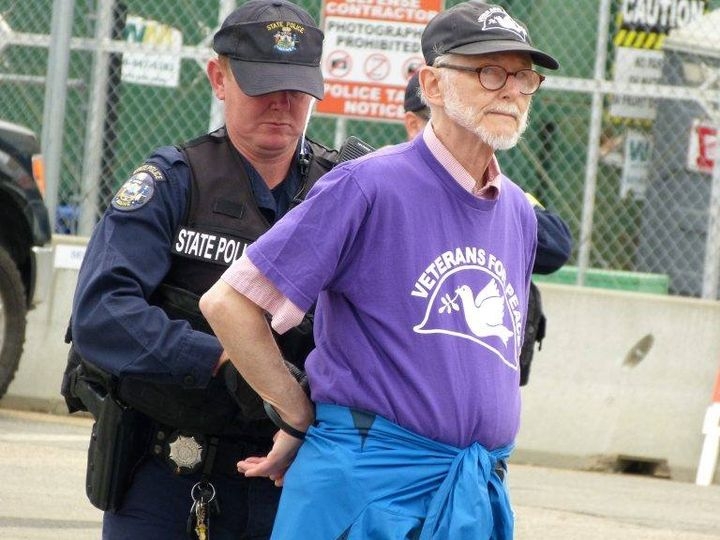
Eons ago in my last year of college, John Rawls’ A Theory of Justice was the text book for my political science class. The class was assigned to write about the factors that led to Nazi Germany’s murderous rampage. What characteristics did the fascists (and their supporters) have in common? I decided to write about Nazi Germany from a different angle. I wrote about the people who had resisted the fascists. They shared characteristics in common. Those who had resisted fascism had integrity, compassion, and a conscience.
People who resisted the fascist regime felt a moral obligation to do the right thing. They weren’t necessarily religious, but they did have a shared set of values and believed in a higher good that was greater than themselves. They felt deep compassion for humanity, even for people who were unlike themselves. They also had a heartfelt conscience, which made them take action whenever they witnessed any form of injustice. When they saw a person or a group being treated unfairly, they could not turn away.
Ultimately, people of integrity have deep and abiding compassion and will commit acts of conscience. The reasons for committing acts of conscience are manifold: Laws were designed to benefit a few at the expense of many, or the laws are expedient methods to enact an authoritarian ideology; government commits unconscionable acts of treason against humanity, either an individual or whole classes of individuals; and finally harm to the individual or whole classes of individuals is imminent and irreparable.
Acts of conscience manifest themselves as Civil Disobedience or Civil Resistance. To understand the philosophical and political underpinnings, the classic treatise that comes to mind is Henry David Thoreau’s 1849 “Essay on Civil Disobedience.” Thoreau wrote his essay before the Civil War during a time when slavery divided the nation. Thoreau clearly asserted that Civil Disobedience was a citizen’s duty when the government abused or perverted its power by engaging in acts of outright oppression, or by engaging in acts without integrity or morality. His most poignant kernel of a truth resounds in this statement: “if it is of such a nature that it requires you to be the agent of injustice to another, then, I say break the law.”
Resisting injustice has been put into practice many times. Recall the examples made by the Rev. Martin Luther King, Rosa Parks, and Mahatma Gandhi; they all used non-violent actions to protest injustice. Please see the Rev. Martin Luther King’s Six Principles of Nonviolence. King, Parks, and Gandhi are held to be the icons of non-violent resistance, but there are many every- day heroes who have the courage to consistently organize rallies and show up at protest marches to express moral outrage at injustice.
One person who has never turned away from injustice is Will Thomas of Manchester, New Hampshire. Will Thomas was a high school teacher for thirty-two years at Central High School in the Manchester, New Hampshire School District, where he taught social studies and history. He also started innovative courses that were approved by the school district, one on the Holocaust, and another that evaluated the lessons learned from the Viet Nam War. Through the years, he has been a champion of human rights and has organized and appeared at many protests. He was one of the few who have dared to speak out about the atrocities being committed against the Palestinians, long before the recent carnage in Gaza. He fondly recalls the time he was locked up, protesting outside of Quantico Military Base with about 130 members of Veterans for Peace. The only picture taken by the press was one of Daniel Ellsberg. None were taken of the veterans.

In the coming months, there will be a marked increase of “Civil Resistance.” The shocking dismantling of the U.S. constitution and settled law is unprecedented. The right to due process, habeas corpus, and a fair trial has been squashed under the false pretense of war powers. The system of checks and balances among the three branches of government has been rendered impotent by a tyrannical executive branch and its complicit political party. The malice exhibited toward Diversity, Equity and Inclusion has resulted in the instant erasure of history. The remarkable strides made in the past sixty years toward achieving greater parity among all types of Americans, regardless of race, religion, gender and national origins, have been disrupted and subverted. Nonviolent protest is one way people of conscience can stand strong and united during a time of heinous injustice.
Pat Noonan and Vivi Tallman, two residents of North Tillamook Country in Oregon, recently organized a workshop to teach people the fundamentals of Civil Disobedience (Civil Resistance). The long history of Civil Resistance predates King, Parks, Gandhi, and even Thoreau. The tragic Greek play Antigone, written by Sophocles, circa 440 BC, depicts the heroine defying Creon, the King of Thebes. Antigone chose to obey her conscience rather than to obey the King’s law. There are consequences to Civil Resistance. In Antigone’s case she was sentenced to death.
The workshop created by Pat Noonan and Vivi Tallman clearly describes exactly what can happen to people across the political spectrum when they commit deliberate acts of conscience. They warn, “Subjugating yourself to the criminal justice system is not a decision to take lightly.” Refusal to obey laws or commands comes with risk. A government can choose to imprison those who actively resist their authority. People who resist—even peacefully—can be arrested for disorderly conduct, criminal trespass, or resisting arrest. For those who have never been in the criminal justice system, it is traumatic to be charged with a crime. Your possessions are taken away, you’re photographed, fingerprinted, and incarcerated. You have no other recourse than to call an attorney, make a decision about how you will plea, and post bail.

It’s complicated to determine why some people are prepared to act out of conscience and others might be ambivalent or uninterested. Will Thomas said he has been arrested at least 8 times, maybe nine. “I’m 82. People ask me, ‘What are you doing this for?’ I say, ‘because my conscience tells me to do so. I have to. So that's it, that's my story.”’
During these times of unconscionable tyranny in America, we can look to our past to find solace in the words of the Rev. Martin Luther King, who wrote his powerful letter while he was imprisoned in Birmingham, Alabama. His only crime had been “parading without a permit” after leading a nonviolent demonstration against segregation.
Vivi Tallman feels a deep connection to her community. She does not enumerate all of the influences in her life, but during her adolescence she knew many young people who were working on civil rights issues. Her family had a big dairy farm in Tillamook County, Oregon and had started a lot of non-profit groups. “If you wanted to influence something, change something or be something, you’d figure out how to start that organization. All of those things have led me to investigate how to take an active role in political life right now.”
For people who don’t have access to community workshops or activist leaders in their own community, there are new pundits who offer excellent advice regarding Civil Resistance. Erica Chenoweth, a political scientist at Harvard University, explains “that civil resistance is a nonviolent strategy where ordinary people coordinate to demand and protect democracy.” Chenoweth has a YouTube channel that emphasizes the strategic power of nonviolent protest. She asserts “that nonviolence is inclusive and more likely to succeed because it allows widespread participation.”
Because of the aberrant political times we live in, it’s important to emphasize the strategic power of nonviolent protest. Government has recently changed the name of the Pentagon to the Department of War, and has invoked war imagery while threatening to deploy the National Guard to Chicago. There are reasons to suggest that the government is prepared to engage in violence to ensure its authoritarian posturing and to stay in power. Yet history proves that the surest way to douse the fire of violence is with nonviolent resistance.
Will Thomas remembers visiting Berlin, Germany, and observing the gold plaques outside of homes where people once lived but who had been sent to Auschwitz and died there. He learned of one story: a group of non-Jewish women were married to Jewish men who had been imprisoned in Berlin and were about to be sent to a concentration camp. The next night, and successive nights, the wives bandied together outside of the jail, clanging their pots and pans, making a tremendous racket. The ruckus went on for a week or more, until the jailers came out and begged the women to stop, but they would not stop until their husbands were released. Finally, the jailers could not stand their protest and released the men.
There are many reasons why citizens should engage in Civil Resistance. The waves of undocumented people being deported without due process is tearing apart communities and harming businesses of all sizes. Innocent men, women and children have been rounded up in schools, homes, places of worship and workplaces, and sent to detention centers. These hardworking people have a vital place in their communities. According to Vivi Tallman, “I have integrity when I stand up on behalf of justice and when I speak from my values. It’s about human dignity and mutual aid. We as a community see to the needs of everyone.”
Civil Resistance can make a difference in reclaiming power. “It’s a tried and true method for confronting dictators, authoritarians, and fascists,” said Will Thomas. “Nonviolent resistance is how people, united, can stand up to injustice.” When the Rev. Martin Luther King was killed in Memphis, he had been planning a poor people’s march. The march went on without him. Will Thomas remembers the Rev. King saying, “that the moral arc of the universe bends toward justice, and you have to believe that. You have to believe that the universe is on the side of justice. It may take a while to get there, but you can’t give up, you just can’t. My conscience tells me to do so. That’s why I keep doing this.”
It’s been a long time since I read A Theory of Justice by John Rawls, but I recently saw a brand new edition for sale, prominently displayed on the front table of a Seattle bookstore. “My college textbook,” I exclaimed, but I shouldn’t have been surprised. Dictatorial regimes come and go, laws come and go, but people, who have integrity, compassion, and a conscience, do make the difference that allows for justice to prevail.
##
LINKS:
Veterans for Peace https://www.veteransforpeace.org/
Daniel Ellsberg https://en.wikipedia.org/wiki/Daniel_Ellsberg
The Rev. Martin Luther King’s Letter From Birmingham https://prforpeople.com/news/world-views/letter-birmingham-jail-excerpts
The Rev. Martin Luther King’s Six Principles of Nonviolence https://prforpeople.com/news/world-views/rev-martin-luther-king%E2%80%99s-six-principles-nonviolence
Video on YouTube Erica Chenoweth Civil Resistance: What Everyone Needs to Know https://youtu.be/TTckJzV1xIA?si=mjQsfqwoaiSVVRDq
Suggested Readings:
Civil Disobedience by Henry David Thoreau
A Theory of Justice by John Rawls
Civil Resistance: What Everyone Needs to Know by Erica Chenoweth








